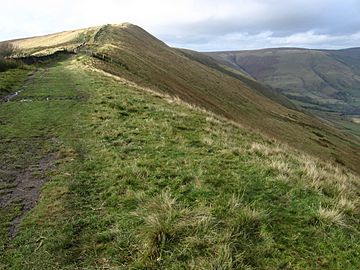Rushup Edge facts for kids
Rushup Edge is a long, raised area of land, like a natural wall, located in the beautiful Peak District in Derbyshire, England. It's a popular spot for outdoor activities. The very highest point of this ridge is called Lord's Seat, which reaches about 550 meters (1,804 feet) above sea level.
Lord's Seat is also known as a round barrow, which is an ancient burial mound shaped like a small hill.
Quick facts for kids Lord's Seat (Rushup Edge) |
|
|---|---|

Rushup Edge towards Lord's Seat
|
|
| Highest point | |
| Elevation | 550 m (1,800 ft) |
| Prominence | 62 m |
| Parent peak | Kinder Scout |
| Listing | Dewey, TuMP |
| Geography | |
| Location | Derbyshire, England |
| Parent range | Peak District |
| OS grid | SK111834 |
| Topo map | OS Landranger 110 |
What is Rushup Edge Made Of?
Rushup Edge is part of a larger ridge that stretches towards other famous hills like Mam Tor and Lose Hill. This ridge helps separate two valleys, the Edale Valley and the Hope Valley.
The rocks that make up Rushup Edge were formed a very long time ago, about 320 million years ago. They are mostly made of layers of sandstone and siltstone. Sandstone is a rock made from tiny grains of sand, while siltstone is made from even finer particles, like mud.
Over time, parts of the northern side of the ridge have experienced landslides. This means that large amounts of earth and rock have slid down the slopes, creating new deposits of material called colluvium.
Community Action and Protests
In October 2014, a group of people who love the outdoors came together to protest. This group included mountain bikers, walkers, horse riders, climbers, and people who work to protect nature.
They were upset about some maintenance work being done by the Derbyshire County Council on a path along Rushup Edge. They felt the work was not done carefully, cost too much money, and was bad for the environment. They also felt that the council had not asked for their opinions before starting the work.
Because of these protests, the Derbyshire County Council stopped the work in December 2014. They then talked with the protesters to find a better way forward. This shows how local communities can work together to protect their natural spaces.
 | Emma Amos |
 | Edward Mitchell Bannister |
 | Larry D. Alexander |
 | Ernie Barnes |

